Weddings in Islam
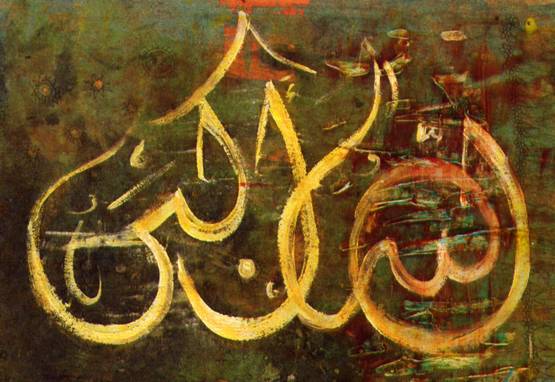
The Arabic language when spoken carries great power for Muslim people. Likewise the written expression of the language the most acceptable form of art; the letters above are read as “Allah Akbar” ( “God is great”).
Perhaps in some places in the Islamic world, photographers are not even allowed at a wedding; also a wedding is not a sacrament or a religious event in which a imam has to be present in Islam, in conrast to the practice of Christians who want a priest or pastor or for Jews who want a rabbi to celebrate their weddings.
I have performed only one wedding for a Muslim, so far. He came from Iran, and he married Sandy Crabtree, a graduate of the University of Redlands who majored in religious studies. Even though the wedding was held in Northern California, I agreed to go as a wedding gift to her, and by going I wanted to affirm that I feel I can perform the weddings for individuals of different religious backgrounds. She was after all a Presbyterian! Moreover, I had studied Islam and taught some of its teachings to Sandy
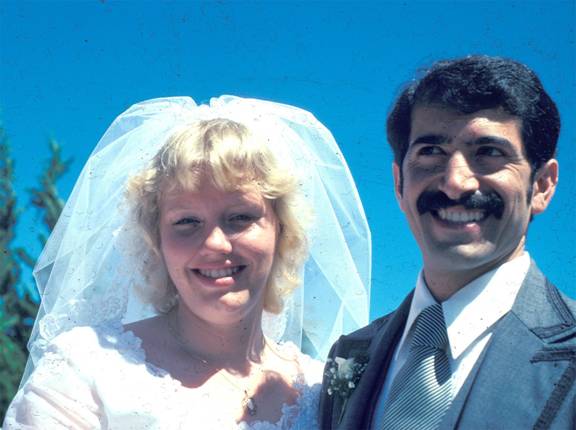
Recently I read that the Qur’an grants a Muslim man permission to marry a Muslim woman, a Jewish woman or Christian woman, and the marrige will be valid as long as she is remains faithful (Faruqi 64). Thus it was for centuries, as "Muslim men married other women of the Book, who were permitted to practice their own religion but were absorbed into their husban’s family along with their Muslim children.” (Miller, “Beliefwatch Marriage” cf. blog in xtra.newseeek.com “On Faith”).
It seems to have been assumed that these brides would soon convert to Islam, and many certainly did so. Not all did so, and in India wives for Muslim rulers who often chosen not merely from their beauty but as representatives of an empire.
After this wedding, I continued to read more about the role of women in marriage in Islam. Performing an inter-faith marriage like this one picture above leads one to be much more interested in marriages across religious and racial lines.
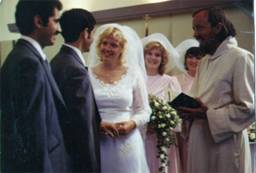
From my research for the project on weddings, I learned that in Islam marriage is clearly not the equivalent of a sacrament as in Roman Catholicism. Marriage is not one of the Five Pillars of Islam, but marriage is important in the Qur’an, and it is mentioned several times in different Surahs (chapters). Also the idea of the family is important in the teachings of Islam. During the counseling sessions for the wedding pictured above, I remember the groom telling me that he wanted a big family here, and he was already helping his brothers “escape” from Iran. He already had managed to arrange for one of his brothers to join him in California, and he would be able to help others soon.
His brother was present at the wedding.
Sandy, his bride, came from a family where she was the only child, and I wondered how much of an adjustment for her would be the aim of bringing more siblings into their family circle. A few years later I was sent the picture of their first son.

Wadud wrote that “there is no term in the Qur’an which indicates that child-bearing is ‘primary’ to a woman. No indication is given that mothering is her exclusive role…this capacity is essential to the continuation of human existence" (Donohue, 158).
In order to have a wedding in the Muslim community, there must be "an agreement between a man and a woman which is embodied in a written contract" (Faruqi, 61.) It must have the signature of the bride and groom and their witnesses and list the amount of the dower and the schedule of payment. When the contract is signed it is called 'AQD NIKAH and is iusually signed at the home of the bride's family. Sometime thereafter, depending upon the terms of the contract, there willl be a party called a 'URS, which can be a simple gathering or a huge elaborate event. The couple receive gifts from guests and the bride and groom give items of clothing to slose relative or a platter for carrying sweets to others. I was given an article of clothing, a fabulous shirt by the groom once when his wife came to teach about Islam, especially the role of women in Islam, at the University of Redlands. I did not know when I admired the shirt that it would be given to me, nor did I suspect he had worn it at his wedding.. But to me it was a powerful symbol to cherish, a kind of delayed wedding present to a guest who did not make it to his wedding!
Meanwhile, I have tried to understand how modern Muslims would practice their religion in the modern world. The modern reformer Muhammad Abdu (l849-1905), who maintained that the true intent of the Quran was monogamy, because marriage to more than one wife was contingent on equal justice and impartial treatment of each wife” ( Esposito, 131 ff.).
My students today learn in world religions classes that it is possible in the Islamic world to have more than one wife at the same time, and in fact one recent student from Libya told my class he was the 4th son of the 4th wife. So while it is possible to today to meet such a person, even as a student in America, since in the Quran (4:3) it is possible to have up to four wives, by contrast we read (4:129) “you will never manage to deal equitable with women no matter how hard you try” Abduh maintained that since this was a practical impossibility the Quranic ideal was monogamy….and his use of public interest as an Islamic justification for legal reform were adopted by the reformers in Egypt and in other Muslim countries to introduce changes in family law” (Esposito, 133).
I have received a wedding invitation from Seher Ali, a Muslim student at the University of Redlands who found her own marriage partner while in America. She told me that she planned to be married back in Pakisan, her home country. She sent me the invitation below:
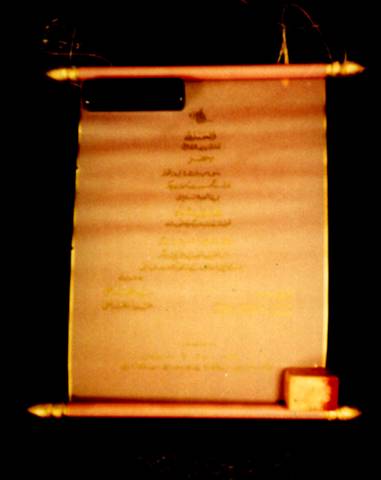
The invitation, on a parchment scroll as if from an ancient time, has turned somewhat yellow. The lettering is done in Arabic script, with the date, and place, the names of the bride and groom. The language itself is Urdu. While the wedding invitation in form might appear strange, when translated it seems to be influenced by Western invitations.
The invitation came with no explanation'but with some help, I learned that it had come from Pakistan from Seher Ali, who graudated from the University of Redlands in 2001. She is holding my copy of the Koran, which she read from duing a ceremony in the University of Redlands Memorial Chapel on the eve of her graduation.
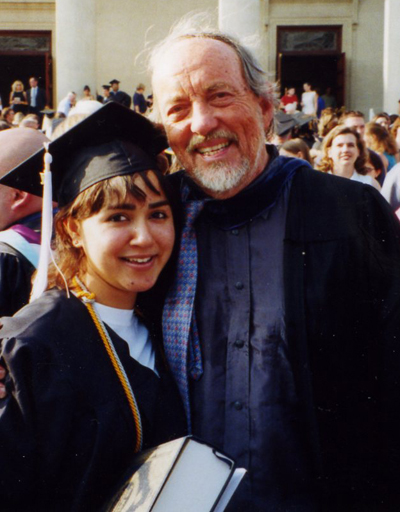
islam2001.jpg
Although she went home to be married a man she had come to know in America from Pakistan, it was her intent to go to live in a country somewhere between America and Pakistan, not only in a geographic sense, but one which had more of a daily life within the Islamic practice and traditions but with an openness to the West. Reading the reports of difficulty in Pakistan in these days with increasing displeasure with the USA, I wonder how she would be treated by those who know she studied in Redlands. I expect to hear from her someday from Turkey, which was one of the choices she and her bridegroom were considering at the time they made their wedding plans.
One author noted that the "Islamic marriage is not a 'ceremon." Although it may be associated with a number of elaborate activies .....processio of the bride to her new husband's hom 'beautification of the bride'..
gift-giving and well wishing of rriends and relatives
elaborate clothing, refreshments and entertainment.."(Faruqi, 64).
To review, in any case here must be a written contract that stipulates the dower signed by witnesses one representing the ride and the other the groom.
The bride's father must seek the brid's will in this matter. Some jurists argue that is necessary and others that it is "commendable rather than necessary" (Faruqi, 63)
Finally, the Muslim faith does not consider marriage a "sacred" act on the order of the Five Pillars" and the wedding "cannot be considered a sacred ceremony" (Faruqi 64). Moreover, dissoulution of the marriage can come by death and by divorce. In the HADITH, the words attributed to the Proophet Muhammed, as in contrast to the words from Allah in the QURAN, it has been recorded that "of all the permitted acs he one disliked most by God (Allah) is divorce" (S. Ameenul Hasan Rizvi, "Women and Marriage in Islam," The Muslim World League Journal, vol. 12, no 1 ((Muharram, 1404, AH O(ctober l984) p. 26 cited by Faruqi 64). Nonetheless, divorce is possible with various forms by which it is initiated. |